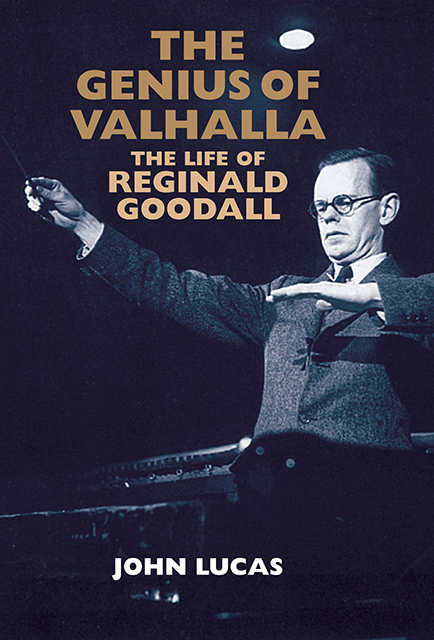Book contents
- Frontmatter
- Dedication
- Contents
- List of Illustrations
- Foreword
- Introduction and Acknowledgments
- CHAPTER 1 Lincoln
- CHAPTER 2 Exile
- CHAPTER 3 Sacred and Profane
- CHAPTER 4 High Holborn
- CHAPTER 5 Young Britten
- CHAPTER 6 Amateur Nights
- CHAPTER 7 Bournemouth at War
- CHAPTER 8 Private’s Progress
- CHAPTER 9 Enter Grimes
- CHAPTER 10 From Berlin to Lucretia
- CHAPTER 11 Covent Garden
- CHAPTER 12 Galley Years
- CHAPTER 13 Triumph
- CHAPTER 14 Resounding Ring
- CHAPTER 15 Tristan
- CHAPTER 16 The Final Years
- Notes
- APPENDIX I Discography
- APPENDIX II Choir repertory of St Alban the Martyr, Holborn, 1926–1936
- APPENDIX III Works conducted by Goodall with the Wessex Philharmonic Orchestra
- APPENDIX IV Selected Bibliography
- Index
Introduction and Acknowledgments
Published online by Cambridge University Press: 07 March 2023
- Frontmatter
- Dedication
- Contents
- List of Illustrations
- Foreword
- Introduction and Acknowledgments
- CHAPTER 1 Lincoln
- CHAPTER 2 Exile
- CHAPTER 3 Sacred and Profane
- CHAPTER 4 High Holborn
- CHAPTER 5 Young Britten
- CHAPTER 6 Amateur Nights
- CHAPTER 7 Bournemouth at War
- CHAPTER 8 Private’s Progress
- CHAPTER 9 Enter Grimes
- CHAPTER 10 From Berlin to Lucretia
- CHAPTER 11 Covent Garden
- CHAPTER 12 Galley Years
- CHAPTER 13 Triumph
- CHAPTER 14 Resounding Ring
- CHAPTER 15 Tristan
- CHAPTER 16 The Final Years
- Notes
- APPENDIX I Discography
- APPENDIX II Choir repertory of St Alban the Martyr, Holborn, 1926–1936
- APPENDIX III Works conducted by Goodall with the Wessex Philharmonic Orchestra
- APPENDIX IV Selected Bibliography
- Index
Summary
“When you conduct other things – things other than by Wagner – you find there's something lacking. You miss the richness and the depth and the potency of his music” – Reginald Goodall, talking to the author, 1987.
I FIRST HEARD Goodall conduct in the 1950s. He was on the staff of Covent Garden, though his appearances in the pit there were sporadic. He gave performances of Manon, Turandot and Bohème that were cogent and illuminating, and he breathed life into Britten's Gloriana aft er its unfortunate premiere under John Pritchard. His Meistersinger – “Not my Meistersinger,” I can hear him saying crossly, “Wagner’s” – won him glowing notices in the press, as did the performances of Die Walküre he conducted on tour. Yet by the end of the decade he had all but disappeared from view. It was puzzling, but I knew nothing then of operatic politics.
At a party at the 1961 Edinburgh Festival I was introduced to a Covent Garden stalwart, the baritone Geraint Evans, who regaled his fellow guests with tales of the Opera House. What, I asked him, had happened to Goodall? He adopted a solemn expression. “Ah, Reginald,” he said, rolling the initial R theatrically. “Poor Reginald.” He then changed the subject. Clearly, as far as Covent Garden was concerned, Goodall was a spent force. Yet seven years later, at the age of sixty-six, he made an extraordinary comeback, with a production of The Mastersingers for Sadler's Wells Opera that demonstrated beyond dispute that here was a great Wagner conductor in a tradition stretching back through Hans Knappertsbusch and Karl Muck to Hans Richter, conductor of the first Ring cycle at Bayreuth in 1876.
Goodall had watched Knappertsbusch at work during his visits to Bayreuth throughout the 1950s, and from him had learned how to build the acts in great, seamless arches, how to relate one tempo to another, how to balance the sound so that each individual strand in the orchestral fabric could be heard, how to ensure, through close attention to the dynamic markings in the orchestral parts, that singers were never drowned.
- Type
- Chapter
- Information
- The Genius of ValhallaThe Life of Reginald Goodall, pp. xi - xviPublisher: Boydell & BrewerPrint publication year: 2009



